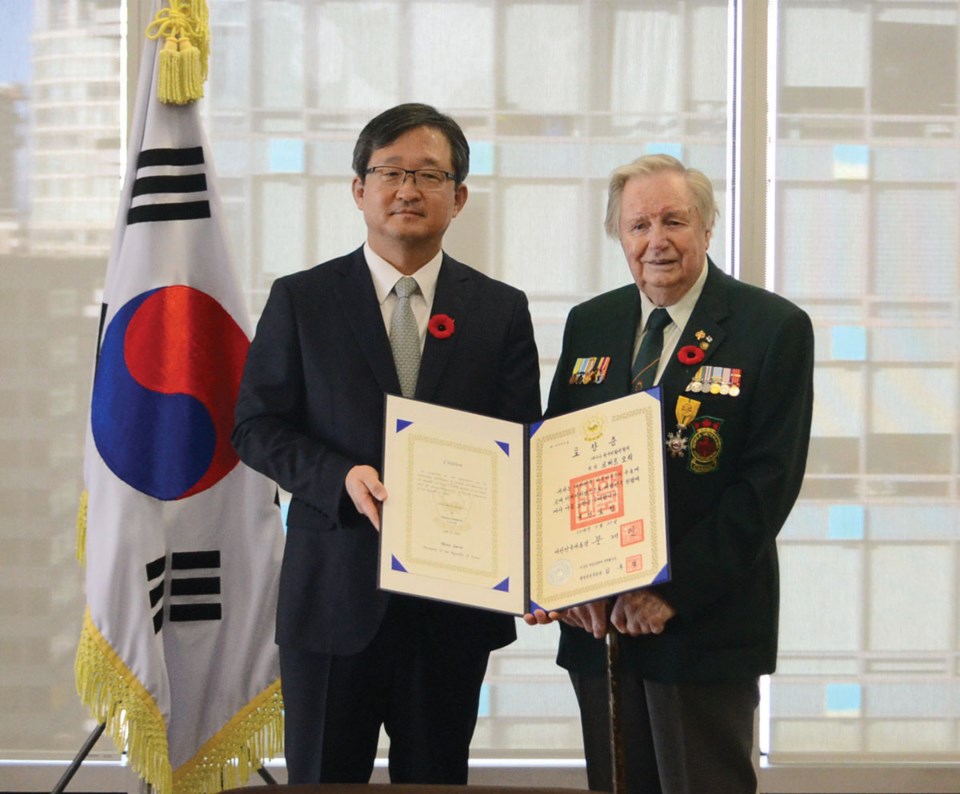It might be viewed as the forgotten war, or even the unknown war, but for Bob Orrick, it holds a special place in his heart.
The Ladner veteran had just turned 17 when he signed up for the navy, eventually serving the better part of two years on the Athabaskan during the Korean War.
“The navy was a natural fit,” says Orrick, whose father had served in the navy during the Second World War and was on one of the fist Canadian ships to leave for the Korean peninsula after the conflict broke out 70 years ago today.
The younger Orrick spent a year training as a communicator before leaving in 1952 on the Athabaskan, which carried out a number of functions during the war. From escorting aircraft carriers and picking up downed airmen to patrolling for submarines, sweeping for mines and launching in-shore bombardments, the Royal Canadian Navy ship was kept busy on the west side of the peninsula.
“There wasn’t always a lot happening, but that (in-shore bombardments) was exciting, really exciting when they shot back,” he jokes.
Orrick is proud of the role Canadian forces played in repelling the North Koreans that eventually led to a 1953 ceasefire, although not before 516 Canadians had died, making the Korean War this country’s third deadliest conflict.
After contracting rheumatic fever, Orrick returned home late in 1953, which led to a chance encounter that would change his life forever. While waiting in a lineup outside a Victoria movie theatre with a fellow Korean War vet, he met an attractive young woman, who he would propose to three weeks later and end up married to for 65 years until her recent passing.
The couple had five children as well as 13 grandchildren, 14 great-grandchildren and two great-great-grandchildren.
After returning to Canada, Orrick served in the navy for another two decades, stationed on both coasts and on many ships, including one with his father, before retiring as a senior communicator in 1974.
In his post-military career, he first turned to the newspaper business before becoming a ministerial assistant to a provincial cabinet minister and then part of a pair of international marketing companies. Most recently he was a private tutor.
The Korean War, however, has always been close to his heart, which is why he got involved with the Korean Veterans Association, eventually becoming the organization’s national public information officer. Orrick says his primary focus was to educate people about the Korean War and Canada’s prominent role in the conflict.
“It’s in my blood to spread awareness about the war and to educate the educators and the politicians,” he says of an effort that has been difficult and disheartening at times, but also rewarding.
In his role with the Korean Veterans Association, Orrick used his background in politics and the media to help lobby the federal government to create a medal for Korean War veterans, a three-year effort that ultimately met with success in the mid-1980s.
When asked why the Korean War is often overlooked, Orrick is philosophical, pointing to the fact it began just five years after the Second World War ended and at a time when Canadians were more focused on getting their slice of prosperity than taking part in another war.
Coupled with television being in its infancy, he says the Korean War simply wasn’t part of the public consciousness, at least not for a great many Canadians. He says people at that time were often unaware there was even a war going on in Asia, to the point that when veterans returned home they were asked, “Where have you been?”
He says the forgotten, or unknown, war is not just an issue in Canada as Korean War veterans he’s met from other countries report the same experience.
“I talk to veterans from other countries and they all agree, nobody knows about it.”
Orrick has returned to South Korea for events to mark anniversaries, including in 1991 when he gave an address on behalf of all 21 United Nations member countries that came to South Korea’s aid in 1950. He returned in 2010 for events to recognize the 60th anniversary.
In 2018, Orrick received the Civil Merit Medal at a ceremony in Vancouver for his outstanding contributions to freedom and democracy of the Republic of Korea. The medal was presented by ROK Consul-General Byung-won Chung on behalf of Moon Jae-in, president of the Republic of Korea.
Orrick has written three books about the Korean War, including Indelible Memories, which focuses on Canadian sailors, They Fought Valiantly, which offers personal accounts from South Korean soldiers and marines, and Canada’s Three Korean Wars, which highlights the roles of the army, navy and air force.



